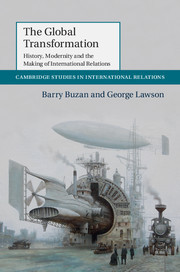Description
The Global Transformation
History, Modernity and the Making of International Relations
Cambridge Studies in International Relations Series
Authors: Buzan Barry, Lawson George
This book shows how the political, economic, military and cultural revolutions of the nineteenth century shaped modern international relations.
Language: English
Subject for The Global Transformation:
Approximative price 89.58 €
In Print (Delivery period: 14 days).
Add to cart
The Global Transformation
Publication date: 02-2015
426 p. · 15.2x22.9 cm · Hardback
Publication date: 02-2015
426 p. · 15.2x22.9 cm · Hardback
Approximative price 31.44 €
In Print (Delivery period: 14 days).
Add to cart
The Global Transformation
Publication date: 02-2015
421 p. · 15.3x22.8 cm · Paperback
Publication date: 02-2015
421 p. · 15.3x22.8 cm · Paperback
Description
/li>Contents
/li>Biography
/li>
The 'long nineteenth century' (1776?1914) was a period of political, economic, military and cultural revolutions that re-forged both domestic and international societies. Neither existing international histories nor international relations texts sufficiently register the scale and impact of this 'global transformation', yet it is the consequences of these multiple revolutions that provide the material and ideational foundations of modern international relations. Global modernity reconstituted the mode of power that underpinned international order and opened a power gap between those who harnessed the revolutions of modernity and those who were denied access to them. This gap dominated international relations for two centuries and is only now being closed. By taking the global transformation as the starting point for international relations, this book repositions the roots of the discipline and establishes a new way of both understanding and teaching the relationship between world history and international relations.
Introduction; Part I. The Global Transformation and IR: 1. The global transformation; 2. IR and the nineteenth century; Part II. The Making of Modern International Relations: 3. Shrinking the planet; 4. Ideologies of progress; 5. The transformation of political units; 6. Establishing a core-periphery international order; 7. Eroding the core-periphery international order; 8. The transformation of great powers, great power relations and war; Part III. Implications: 9. From 'centred globalism' to 'decentred globalism'; 10. Rethinking international relations.
Barry Buzan is Emeritus Professor in the Department of International Relations at the London School of Economics and Political Science, a Senior Fellow at LSE IDEAS and a Fellow of the British Academy. Among his books are International Systems in World History (2000, with Richard Little); Regions and Powers (Cambridge, 2003, with Ole Wæver); From International to World Society? (Cambridge, 2004, with Ole Wæver); The Evolution of International Security Studies (Cambridge, 2009, with Lene Hansen) and An Introduction to the English School of International Relations (2014).
George Lawson is an Associate Professor of International Relations in the Department of International Relations at the London School of Economics and Political Science. His research focuses on the interface between international relations and historical sociology, and on processes of radical change, most notably revolutions. He is the author of Negotiated Revolutions (2005) and editor of The Global 1989 (Cambridge, 2010, with Chris Armbruster and Michael Cox).
George Lawson is an Associate Professor of International Relations in the Department of International Relations at the London School of Economics and Political Science. His research focuses on the interface between international relations and historical sociology, and on processes of radical change, most notably revolutions. He is the author of Negotiated Revolutions (2005) and editor of The Global 1989 (Cambridge, 2010, with Chris Armbruster and Michael Cox).
© 2024 LAVOISIER S.A.S.




